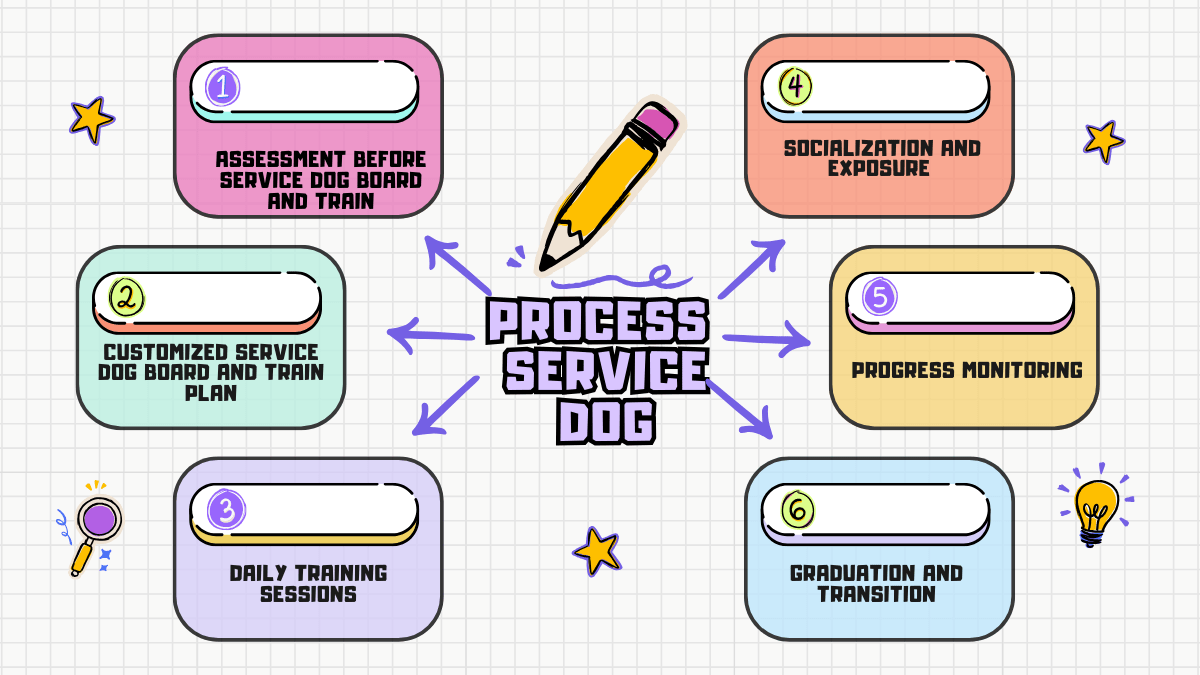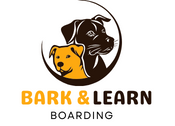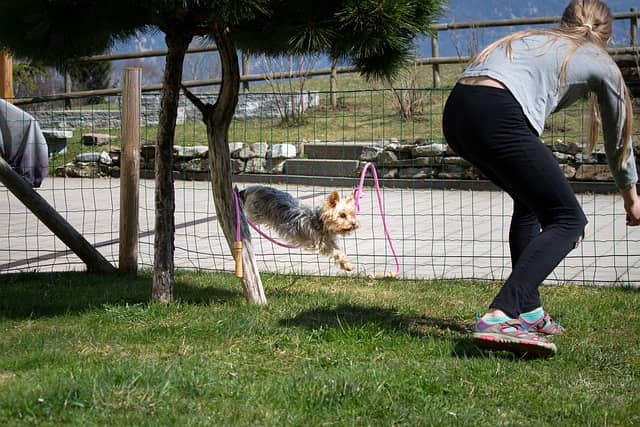Service dog board and train …the term looks familiar.
Yes, you guessed right!
Service dogs are more than just loyal companions; they aid individuals with disabilities, providing essential support and enhancing independence. However, becoming a fully trained service dog is not always easy.
That’s where service dog board-and-train programs come into play. These programs are vital in preparing these remarkable animals for their crucial roles as assistance companions.
This comprehensive guide will delve into the world of service dog boards and train, exploring what these programs entail, their benefits, and how they positively impact dogs and their handlers.
Service Dog Board and Train:
Service dog boards and training programs provide intensive training for dogs to become service animals.
Unlike traditional training methods, where owners are primarily responsible for their dog’s training, board and train programs involve sending the dog to a specialized facility where professional trainers work intensively with them.
These programs typically last several weeks to several months, during which the dogs undergo rigorous training tailored to their specific needs and the tasks they’ll perform as service animals.
The Significance of Service Dogs Board and Tarin Programs:
Before delving into the intricacies of board and train programs, it’s essential to understand the significance of service dogs in the lives of people with disabilities.
These highly trained animals offer services, including guiding individuals with visual impairments, alerting those with hearing loss to essential sounds, providing stability and balance to individuals with mobility issues, and even detecting medical emergencies such as seizures or blood sugar levels.
For many people with disabilities, service dogs are not just companions but lifelines, enabling greater independence and participation in daily activities.
Benefits of Service Dog Board and Train Programs:
Service dog boards and training programs offer numerous benefits for dogs and their future handlers. These trainers possess in-depth knowledge of canine behavior, learning theory, and the specific tasks required of service dogs.
Additionally, board and train programs provide a structured environment conducive to learning. Dogs in these programs are immersed in training activities daily, allowing for consistent reinforcement of desired behaviors.
Furthermore, board and train programs offer socialization opportunities for service dogs. They interact with trainers, other dogs, and various environments, helping them become well-adjusted and confident in different situations.
1. Specialized Training:
Board-and-train programs offer specialized training designed to meet service dogs and their handlers’ unique needs. One significant advantage is the expertise of professional trainers in service dog training.
Professional trainers utilize evidence-based techniques to teach dogs essential tasks, such as retrieving items, opening doors, or providing mobility assistance, depending on the handler’s requirements.
2. Intensive Socialization:
Socialization is crucial for service dogs to acclimate to various environments, stimuli, and social interactions. Board and train programs expose dogs to different settings, including busy streets, crowded spaces, and public transportation, helping them become confident and well-behaved.
3. Professional Guidance:
Professional trainers play a pivotal role in the success of board and train programs. With their expertise in canine behavior and training methodologies, they can address behavioral issues, reinforce positive behaviors, and adapt training techniques to suit each dog’s learning style.
4. Accelerated Progress:
Board and train programs allow for accelerated progress in training, enabling dogs to master essential skills more efficiently than traditional training methods. The structured environment, consistent reinforcement, and focused instruction contribute to faster skill acquisition and more excellent proficiency.
5. Support for Handlers:
In addition to training the dogs, board, and train programs provide handlers with support and guidance. Trainers educate handlers on handling techniques, communication cues, and best practices for maintaining their dog’s training once they return home. This support fosters a strong bond between the handler and their service dog and ensures ongoing success beyond the program.
Process of Service Dog Board and Train Programs:

1. Assessment Before Service Dog Board and Train :
The process begins with thoroughly assessing the dog’s temperament, behavior, and potential suitability for service work. Trainers evaluate the dog’s strengths, weaknesses, and aptitude for learning specific tasks.
2. Customized Service Dog Board and Train Plan:
Based on the assessment, trainers develop a customized training plan outlining the objectives, tasks, and milestones to be achieved during the program. This plan serves as a roadmap for the dog’s training journey.
3. Daily Training Sessions:
Training sessions are conducted daily, focusing on obedience commands, task training, and behavior shaping. Trainers employ positive reinforcement techniques to encourage desired behaviors while addressing issues or challenges.
4. Socialization and Exposure:
In addition to training sessions, dogs are exposed to various socialization experiences, such as interactions with people, other animals, and different environments. This exposure helps build confidence and adaptability in diverse settings.
5. Progress Monitoring:
Trainers closely monitor the dog’s progress throughout the program, tracking achievements, identifying areas for improvement, and adjusting the training plan as needed. Regular assessments ensure that the dog remains on track toward its training goals.
6. Graduation and Transition:
Upon completing the program, the dog undergoes a final evaluation to assess its readiness for service work. Once deemed suitable, the dog graduates from the program and transitions to its new role with its handler.
Impact of Service Dog Board and Train Programs
The impact of service dog boards and training programs extends beyond basic obedience training. For dogs, these programs represent an opportunity for personal growth, increased confidence, and a sense of purpose. Through positive reinforcement and structured training, dogs develop the skills and behaviors necessary to effectively fulfill their service animals’ roles.
The impact of service dog board and train programs is life-changing for handlers. Service dogs provide not only practical assistance but also emotional support and companionship. With a well-trained service dog, handlers experience greater independence, improved quality of life, and enhanced participation in daily activities.
1. Enhanced Independence:
For individuals with disabilities, service dogs trained through board and train programs offer increased independence and autonomy. These dogs have the skills and capabilities to assist their handlers in various tasks, empowering them to navigate daily life with greater confidence and freedom.
2. Improved Quality of Life:
Service dogs not only provide practical assistance but also emotional support and companionship. Their presence can alleviate feelings of isolation, anxiety, and depression, significantly enhancing the overall quality of life for their handlers.
3. Greater Accessibility:
By undergoing specialized training, service dogs can navigate public spaces and perform specific tasks to mitigate their handler’s disability. This increased accessibility enables individuals with disabilities to participate more fully in social, educational, and professional activities.
4. Positive Social Impact:
Service dogs are ambassadors for disability awareness, promoting social acceptance, inclusion, and understanding. Their presence fosters positive interactions and dispels misconceptions surrounding disabilities, promoting a more inclusive and compassionate community.
Challenges and Considerations For Service Dog Board and Train :
While service dog board-and-train programs offer numerous benefits, it’s essential to acknowledge the associated challenges and considerations. One challenge is the cost, as board-and-train programs can be expensive due to the intensive training and professional guidance involved.
Not all dogs, particularly those with severe behavioral issues or health concerns, may be suitable candidates for board training.
Furthermore, the transition period following the completion of a board and train program requires ongoing dedication and consistency from both the handler and the dog. Handlers must continue to reinforce their dog’s training, practice skills regularly, and provide opportunities for socialization to maintain their service dog’s proficiency.
Conclusion:
Service dog board training programs play a vital role in transforming the lives of individuals with disabilities. These programs empower dogs to fulfill their service animals’ roles by providing specialized training, intensive socialization, and ongoing support.
Moreover, they enable handlers to experience greater independence, enhanced mobility, and a stronger bond with their canine companions.
As we continue to recognize the importance of service dogs in supporting individuals with disabilities, we must advocate for accessible training resources and promote the value of service dog boards and training programs.
Through education, awareness, and continued support, we can ensure that more individuals benefit from the life-changing partnership between service dogs and their handlers.

